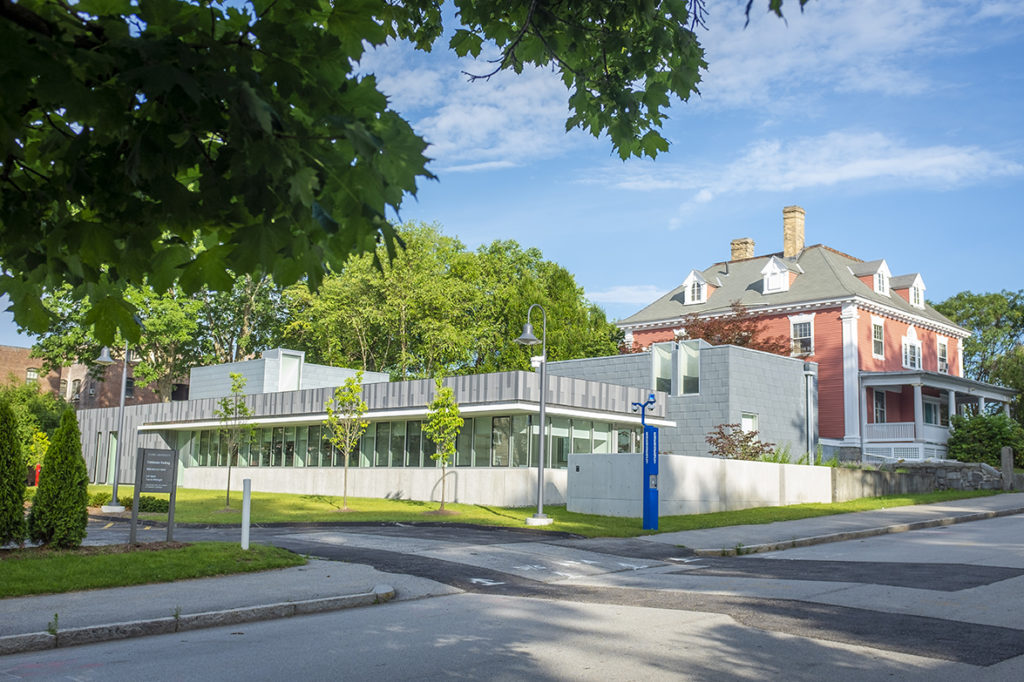Colin Flug Graduate Study Wing provides a haven for genocide researchers

Upon entering the Colin Flug Graduate Study Wing, the latest addition to the complex of buildings that are home to the Strassler Center for Holocaust and Genocide Studies, visitors immediately notice the abundant light and tranquil setting. An airy, comfortably furnished lounge with floor-to-ceiling windows invites nature into the space. The sleek single-story structure, with offices for doctoral students engaged in research on genocide and mass atrocities, provides a calm setting for serious scholarship that can take an emotional toll on researchers.
Completed in spring 2019, construction of the wing coincides with the 20th anniversary of doctoral education at the Strassler Center. With the opening of the wing, the Strassler Center’s doctoral students moved from the cramped third floor of the Victorian-era Cohen-Lasry House to offices that enable challenging studies and deep conversations. A book annex in the new wing is equipped with compact shelving for more than 10,000 volumes. The extra space was needed to relieve the severe shortage of shelving in the Rose Library, built at a time when the fast growth of the newly established Strassler Center could not be anticipated.
The Colin Flug Graduate Study Wing symbolizes the Center’s broadened scope to include genocides around the globe and to debate the lessons from the Holocaust. Having established an international reputation as a leading institute for training historians who study the Holocaust and the Armenian Genocide, the Center is poised for growth. Thomas Kühne, director of the Strassler Center and professor of history, views the wing’s completion as the first of two steps needed to ensure that the Holocaust and genocide studies program remains on the leading edge.
“Now we have to take the next step: enlarge our faculty to include expertise on genocide as manifested in Asia, Africa, and North America and further deepen our insights into the history of the Holocaust and its consequences,” he says.
Mary Jane Rein, executive director of the Strassler Center, says the new wing, as well as the programmatic growth it anticipates, would not have been possible without a lead gift from Clark University trustee Rebecca Colin ’89, Ph.D., and her family. The wing honors her parents, Barbara Flug Colin and Frederick Colin, as well as their families.
Colin believes passionately in the Center’s mission to expand understanding of the Holocaust and other genocides. “The importance and magnitude of the Strassler Center’s objectives have never been more compelling than now,” she says. “This flagship program at Clark University has the capacity to shape a tremendously important field of scholarship, affect international policy, and influence how genocide is addressed and understood. The new wing ensures that the Center has the potential to grow its program.”
President David Angel calls the Colin Flug Graduate Study Wing “an important and most welcome investment in graduate education at Clark University. Preparing the next generation of Ph.D. graduates is essential to ensuring the lessons of history inform our understanding of and call to action in response to genocidal violence.”
The similarity in appearance between the wing and the 21-year-old Rose Library, down to their gray cladding, large expanses of glass, and clean lines, speaks to the vision of Julian Bonder, who designed both structures. Rein says the wing is also a testament to the advocacy of President Angel, who tasked Bonder to design a structure that would respect the Victorian buildings on Woodland Street and orient the Strassler Center’s “mini-campus” toward Clark’s center. Concrete slabs frame a garden space and connect the wing visually to Goddard Library, a modern architectural landmark with massive concrete buttresses.
Stephen Corman, a member of the Strassler Center Leadership Council, funded the garden planted with a grove of trees in memory of his wife Betsy Corman. One of the five student offices, also dedicated to her memory, looks out on this garden space. “Every spring, the trees in the garden will bud and remind students that there is hope for life, even after genocide,” says Corman, who recently deepened his commitment to the program with a significant bequest.
On Sept. 19 and 20, the Strassler Center will celebrate the opening of the Colin Flug Graduate Study Wing and two decades of doctoral education. Professor Debórah Dwork, founding director of the Strassler Center and senior research scholar, will deliver a keynote lecture titled “Americans in Dangerous Territory: Relief and Rescue Operations during the Nazi Years.” An accompanying symposium, “Agency in the Holocaust and Genocide,” featuring Strassler Center doctoral alumni, is planned for the second day.


